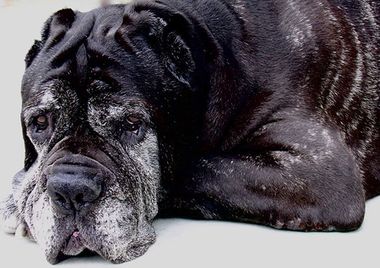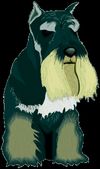 |
||
Why you need special care for an older dogCaring for an older dog can be just as rewarding as caring for a puppy........No, she won't be running around at 100 mph. Nor will she be ready for a game---whenever you want. And your walks together will need to become shorter. But, caring for an elderly dog has its compensations. You will find that you grow much closer to your pet as she comes to rely on you more. Perhaps, you will discover in yourself, a caring side that had previously laid dormant. If you have a young family, there are a great many lessons that can be taught through the ageing processs of your pet. The onset of old age, and old age itself, doesn't have to mean you should treat your dog as if she's on her last legs. Making sure that she is comfortable is one thing--fussing and walking on tiptoes around her is another. She probably knows her own limitations far better than you. So if she's keen to walk a bit further, or brings her toy over for you to play--don't disappoint her. Maintaining her periods of exercise is essential. The walks may be shortened, but don't cut them out altogether.This is the one thing that will help her to retain some of the physical and mental agility she once had, and should be given a large role in any fitness plan you develop. Some breeds of dogs mature earlier than others, and individual dogs can easily broach supposed age limits. One of my dogs Lady, a crossbreed, was reasonably active until 19 years of age. Obviously good or poor general health plays an important part. One of the key areas in maintaining your dog's health, and in helping to alleviate many of the illnesses that afflict older dogs---is in weight control. As she gradually slows down, she burns less energy, she sleeps longer, and a reduction in her overall activity means that fat deposits build up. Weigh her regularly, and adjust her diet to suit. 
There are foods specially formulated for obese, and elderly dogs. Consult your vet---not an advert. The proliferation of white hairs, a lack of lustre in the coat, and a loss of elasticity in the skin are all signs of the onset of old age. Her sight and her hearing may start to deteriorate. Similarily, her ability to fight off infection starts to recede as the immune system starts to become less efficient. Caring for an older dog--The good newsVeterinarian medicine has improved immensely in the last decade or so. Heart conditions, the debilitating effects of arthritis, diabetes, and respiratory problems are all being treated much more effectively nowadays. This means that an elderly dog can lead a far more active, happy life than was one the case. Often people seem to think that an older dog might be helped by getting him a younger companion. Know your dog is the only answer to this. Some dogs would resent a new addition. Especially if he's been the only dog in the household. Other dogs, the sociable, outgoing type, might enjoy the company of a new pal. Think carefully before you make a decision. As humans spend more time at the doctors as they age, so your going to spend more time consulting your vet as your dog age's. Take their advise--they are professionals--with a long history of caring for pets. Don't buy in to the latest snake oil. Don't get fooled by the advert offering the elixir of life--use your commonsense.
Keeping a close eye on your dog is of course obvious. You need to take your dog to the vet if:
Caring for an older dog requires love, patience, understanding and ultimately respect from an owner. It isn't easy, but at some stage you may have to make an important decision.

"
| ||
|
| Dog Health Start Page | Dog Neutering |Caring for an Older Dog |Dog Names Start Page |Dog Videos Start Page | Return to Homepage Or you can .........
|
||
|
|
||